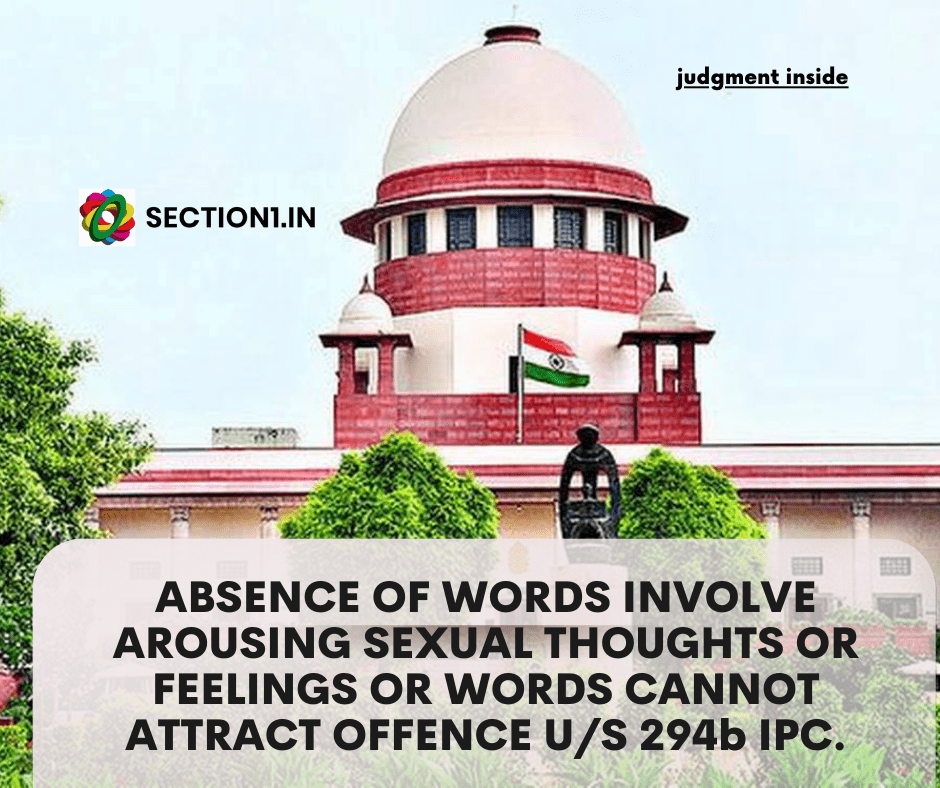2. This appeal is at the instance of the original accused Nos. 1 & 2 in a complaint lodged by the respondent herein before the Court of the Judicial Magistrate at Alandur, Tamil Nadu for the offences punishable under Sections 294(b) and 341 of the Indian Penal Code (For short “The IPC”) and is directed against the order passed by the High Court of Judicature at Madras dated 1st April, 2022 in Crl.O.P.No.5697 of 2019 by which the High Court declined to quash the criminal proceedings instituted by the respondent herein (original complainant). The High Court ultimately rejected the application filed by the appellants herein under Section 482 of the Code of Criminal Procedure (for short “The Cr.P.C.).
ABSENCE OF WORDS INVOLVE AROUSING SEXUAL THOUGHTS OR FEELINGS OR WORDS CANNOT ATTRACT OFFENCE U/S 294B IPC
4. We have gone through the entire complaint lodged by the respondent herein. We asked the learned counsel appearing for the respondent (original complainant) to take us to that part of the complaint which constitutes an offence. To put in other words, the necessary averments in the complaint disclosing the commission of the offence punishable under Sections 294(b) and 341 of the IPC.
…
Thus, all that has been averred in the complaint is that the appellant Madanagopal hurled unparliamentary words towards the complainant.
xxx
8. It has to be noted that in the instance case, the absence of words which will involve some lascivious elements arousing sexual thoughts or feelings or words cannot attract the offence under Section 294(b). None of the records disclose the alleged words used by the accused. It may not be the requirement of law to reproduce in all cases the entire obscene words if it is lengthy, but in the instant case, there is hardly anything on record. Mere abusive, humiliating or defamative words by itself cannot attract an offence under Section 294(b) IPC. To prove the offence under Section 294 of IPC mere utterance of obscence words are not sufficient but there must be a further proof to establish that it was to the annoyance of others, which is lacking in the case. No one has spoken about the obscene words, they felt annoyed and in the absence of legal evidence to show that the words uttered by the appellants accused annoyed others, it can not be said that the ingredients of the offence under Section 294 (b) of IPC is made out.
xxx
INGREDIENTS TO ATTRACT OFFENCE U/S 341 IPC
10. The complaint also fails to disclose the necessary ingredients to constitute the offence of wrongful restraint. In order to attract application of Section 341 which provides for punishment for wrongful restraint, it has to be proved that there was obstruction by the accused; (ii) such obstruction prevented a person from proceeding in a direction to which he had a right to proceed; and (iii) the accused caused such obstruction voluntarily. The obstructor must intend or know or would have reason to believe that the means adopted would cause obstruction to the complainant.
xxx
JUDICIAL APPROACH ON TAKING COGNIZANCE AND ISSUE PROCESS
12. Taking cognizance of an offence under Section 190(1) of the Cr.P.C. and issue of process under Section 204 are judicial functions and require a judicious approach. This is a proposition not only based on sound logic but is also based on fundamental principles of justice, as a person against whom no offence is disclosed cannot be put to any harassment by the issue of process. Issuance of process must be preceded by an application of judicial mind to the material before the court to determine if there is ground for proceedings against the accused. When the allegations made in the complaint are found to be too vague and general without giving any material particulars of the offence alleged against the accused then the order of the Magistrate issuing process on the basis of the complaint would not be justified as there must be material prima facie, for issuance of process. We have our own doubts whether even the verification of the original complainant on oath was recorded before taking cognizance and issuing process.
Case quashed.
PARTY: N. S. MADHANAGOPAL & anr v. K. LALITHA – Criminal Appeal No. 1759 of 2022 – OCTOBER 10, 2022 – [2022] 15 S.C.R. 649.



